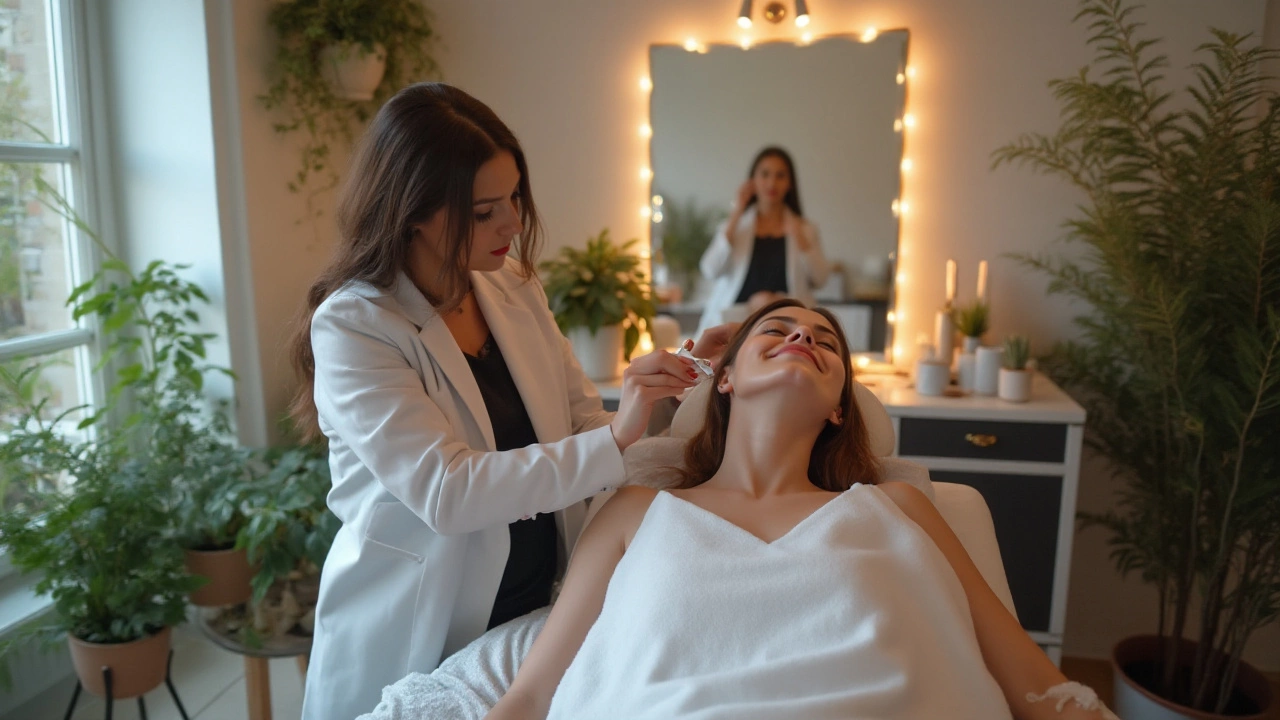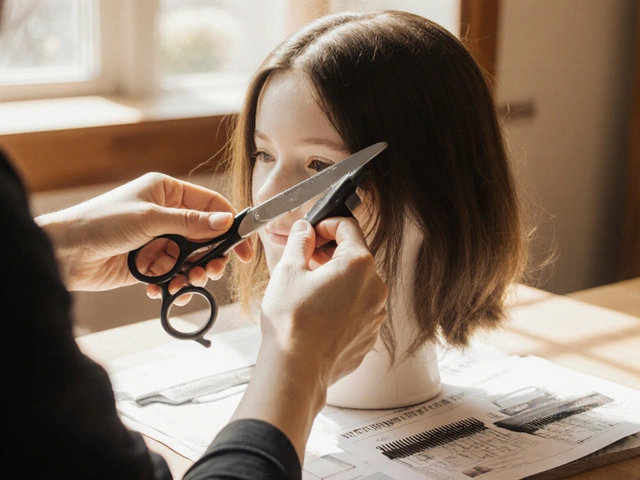Beauty therapy is more than just art; it is a thriving profession, offering unique pathways to express creativity while establishing a lucrative career. Delving into the field can reveal a spectrum of earnings potential that varies widely depending on several critical factors. These include the choice of specialization, geographical location, and the extent of training and education a therapist has undergone.
With beauty standards continually evolving, the demand for skilled beauty therapists is on the rise, paving the way for those committed to enhancing their craft through specialized courses. By understanding the dynamics of the beauty industry, individuals can strategically position themselves to make the most out of their profession financially.
- Understanding the Earnings Spectrum
- Specialization and Its Financial Impact
- The Role of Education and Certification
- Tips to Enhance Your Income as a Beauty Therapist
Understanding the Earnings Spectrum
When it comes to the financial prospects in the world of beauty therapy, the potential can be as diverse as the field itself. A career as a beauty therapist can provide a wide range of earnings, influenced by various factors, making it an increasingly attractive profession for many. The location of one's practice plays a crucial role in determining salary. For instance, professionals in metropolitan areas often have higher incomes due to the increased cost of services typical in urban settings. On the other hand, those working in smaller towns may see a different earning pattern, albeit with potentially lower living expenses.
Another dimension to consider is the choice of employment. Beauty therapists working in established salons tend to have a steady stream of clients, ensuring a reliable income. However, freelancers or independent therapists might experience fluctuating earnings, depending on their ability to market themselves effectively and build a loyal clientele. Interestingly, the demand for freelancers is rising, given the popularity of personalized and on-call beauty services that provide more convenience to clients.
The level of expertise and specialization in specific areas can also greatly affect a therapist's paycheck. Specialists in fields such as massage therapy, aromatherapy, or bespoke facial treatments can command higher fees than generalists. These specializations often require additional certifications, which, while an investment, can significantly boost earnings over time. A quote from a well-regarded industry magazine notes,
"Therapists who continue to upskill in niche areas often see a remarkable increase in their monthly salaries, sometimes as much as 30%."
Moreover, it's essential not just to look at the potential earnings but also the additional perks that may come with the job. In some cases, beauty therapists working in high-end salons or spas might receive tips, commissions on product sales, or benefits such as healthcare, which considerably add to their overall compensation package. According to recent surveys, therapists in upscale settings might earn up to 20% more than those in standard salons due to these added benefits.
For a clearer understanding, consider some statistics: an average full-time beauty therapist salary in 2023 ranged from $25,000 to $55,000 annually, depending on experience and location. The spectrum widens further for those with specializations or those working in luxury settings, where earnings can soar upwards of $70,000 annually. Such figures suggest that the strategic choice of workplace, along with continuous professional development, can be game-changers in a beauty therapist's financial journey.

Specialization and Its Financial Impact
Venturing into the world of beauty therapy opens the gate to numerous specialties, each harboring its own set of financial rewards. As a budding beauty therapist, understanding these specialties is crucial for carving out a profitable career path. Specializing means committing to perfecting a particular skill set, ranging from facial treatments and manicures to advanced dermal therapies and cosmetic tattooing. The financial repercussions of choosing a niche can be substantial, as certain specializations naturally carry heftier price tags and clientele willing to pay premium rates for unique services.
Consider aesthetic skincare treatments—an area witnessing a boom due to the heightened awareness around skincare and aging. Therapists skilled in this domain find themselves in high demand, not just in salons but also in medical spas and dermatological settings. Reports suggest that those diving into medical aesthetics can significantly out-earn their counterparts, often achieving salaries that far surpass the industry average—sometimes reaching six figures.
Another promising field is cosmetic tattooing, or permanent makeup. Certified artists in this vein often command considerable earning potentials due to the precision and permanence of their work. As per a report by the Society of Permanent Cosmetics Professionals, some technicians charge hundreds, if not thousands, for a few hours of work, making it an appealing option for those with a steady hand and an eye for design.
In the words of industry expert, Emma Sullivan, "Specialization is not just about focusing on one thing; it's about redefining your reputation in the industry. Clients are more likely to trust a specialist with years of focused experience when it comes to intricate procedures."
"Specialization is not just about focusing on one thing; it's about redefining your reputation in the industry." — Emma SullivanHer perspective highlights the value clients place on qualification and skill, emphasizing the necessity for targeted courses that hone specific techniques.
Key Specializations and Income Potential
Dissecting the specific earning potential of each specialization presents a clear picture. A survey conducted in 2023 revealed average earnings in various fields, showcasing the broad spectrum of opportunities:
| Specialization | Avg. Earnings (Annual) |
|---|---|
| Medical Aesthetics | $60,000 - $100,000 |
| Permanent Makeup Artist | $45,000 - $75,000 |
| Nail Technician | $20,000 - $35,000 |
| Hair Removal Specialist | $25,000 - $50,000 |
The numbers reflect not only the potential income but also the requisite training and dedication each area demands. For aspiring beauty therapists, investing time and resources into specialized courses pays off in spades, allowing them to cater to niches with fewer competitors.
In summary, the decision to specialize in a particular branch within the beauty therapy field directly correlates with the financial milestones one can achieve. The key lies in identifying personal strengths and passions and then aligning these with market demand. By doing so, beauty therapists can secure not only a steady stream of income but also foster a rewarding career that combines artistry with entrepreneurship.

The Role of Education and Certification
Embarking on a career as a beauty therapist requires more than just a passion for aesthetics; it demands a solid foundation grounded in comprehensive education and recognized certification. These aren't just mere formalities; they serve as the cornerstone for a successful trajectory in this dynamic industry. Educational courses in beauty therapy cover a range of essential skills, from the anatomy of skin and hair to the mastery of innovative beauty treatments. By undertaking these courses, aspiring beauty professionals build a deep understanding that enhances their capacity to deliver high-quality services, an endeavor that could translate into better work opportunities and increased income potential.
In a world where the beauty industry is rapidly advancing, staying ahead means engaging in continuous learning. Employers and clients alike value therapists who exhibit a commitment to their craft, often gauging proficiency through certifications. These act as a seal of assurance, reflecting both skill and dedication. Institutions offering beauty therapy courses frequently align their curriculum with industry standards, ensuring students are adept at the latest techniques. This alignment helps therapists remain competitive and provides a distinct advantage, especially when entering new markets or specialties.
Completing recognized beauty therapy courses is particularly crucial for those wishing to specialize in specific areas like skincare, nail technology, or aromatherapy. Each specialization brings its own set of procedures and techniques, which requires targeted training to safely and effectively administer them. Not only do these certifications provide technical know-how, but they also instill confidence in both the therapist and their clientele. According to the National Accrediting Commission of Cosmetology Arts & Sciences, 'Professionals who continually update their skills through education earn higher clients' trust and often command higher fees.' This perspective highlights the intrinsic link between education and earning power in the beauty sector.
The impact of education doesn't end at increased earnings; it permeates professional development too. Pursuing advanced certifications and courses can open doors to managerial roles or even entrepreneurial ventures such as setting up a private salon. The investment in education can initially seem overwhelming, but it often pays dividends as therapists expand their capabilities and market reach. An analysis by the Professional Beauty Association revealed that beauty therapists who pursued specialization saw up to a 20% increase in their annual income, thus underscoring the financial benefits of continual professional development.
To summarize the importance of education and certification, one must acknowledge its part in shaping successful beauty therapists. Through a dedication to continual learning, bolstered by practical and theoretical training, individuals not only enhance their craft but also widen their horizon of opportunities. It's this blend of knowledge and expertise that positions beauty therapists to thrive in their chosen fields, paving the way for remarkable professional and financial growth.

Tips to Enhance Your Income as a Beauty Therapist
Embarking on a career as a beauty therapist opens doors to a myriad of possibilities for boosting your income. One effective way to increase your earnings is by embracing continuous education and training. Advanced certification courses not only enhance your skills but also make you more desirable in the competitive market. This can lead to higher paying roles or the ability to offer specialized, premium services at a higher price point. Investing in your education is investing in your financial freedom, as it often translates into a more comprehensive service offering that can draw a diverse clientele willing to pay for unique expertise.
Strategically setting up your pricing model can also play a pivotal role in maximizing your income. Consider offering package deals or membership discounts to ensure clients return regularly, solidifying a steady income stream. Diversifying your skill set to include trending treatments can further increase your earnings potential. For instance, incorporating services like microblading or derma-planing, which are in high demand, can attract a new segment of clients eager to try the latest beauty trends, ultimately adding a significant boost to your revenue.
Marketing your services effectively, both online and offline, is another crucial element. Establishing a professional, polished social media presence where you showcase your work, share client testimonials, and engage with your audience can significantly elevate your visibility. Being active online creates the opportunity to connect with potential clients and build a loyal customer base. Consider running workshops or offering free introductory sessions to create awareness about your fantastic skills. This strategy serves the dual purpose of showcasing your expertise and drawing in clients who are likely to seek repeat services.
Networking within the beauty industry can act as a catalyst for your income growth. By connecting with other professionals, you can stay updated on the latest market trends, share referrals, and even collaborate on larger projects that require multiple therapists. These collaborations can open new doors, allowing you to tap into a broader customer base. Attend beauty expos, join professional forums, and actively participate in industry events. Such activities not only expand your professional circle but also position you as a well-connected, knowledgeable therapist in your field.
"In the beauty industry, your skills are your currency, and your network is your net worth," suggests Maeve Andrews, a seasoned career coach for beauty professionals. Her insights highlight the importance of building professional relationships in enhancing your career trajectory.
A savvy therapist will also focus on building a solid client relationship framework to enhance tips and referrals. Client satisfaction goes beyond offering an excellent service—it's about creating an experience. Pay careful attention to customer feedback and strive to exceed expectations. Satisfied clients tend to spend more and are more likely to refer friends and family, providing an additional stream of revenue through word-of-mouth.





Write a comment